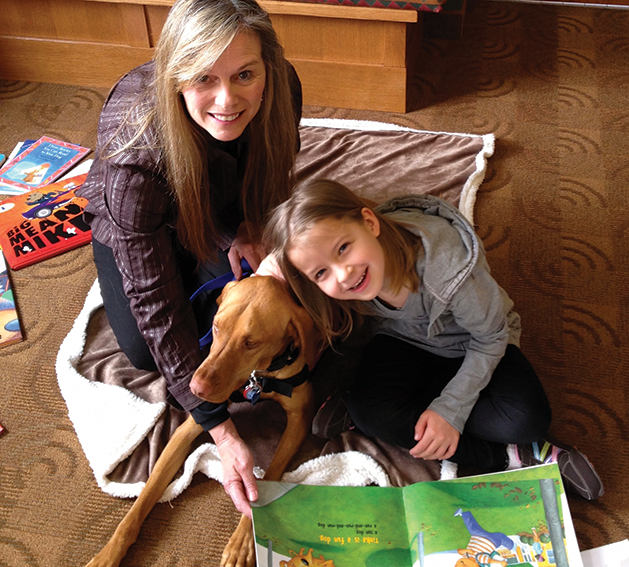
Pet owners know the joys and benefits of having a special animal in their lives. And some pets can do even more. These kind, furry faces can also provide support and connection to those who may need it—whether it’s listening to a child learning to read or visiting with residents in assisted living. While many of us think of therapy animals in these situations, kind and well behaved animals can fill some of these roles too.
Therapy animals come in all shapes and sizes, with nine species in total, from guinea pigs and llamas to cats and rabbits, although the most common are therapy dogs, says Patti Anderson with North Star Therapy Animals.
Since its 2007 beginning, North Star has accepted requests from a variety of events and organizations throughout the Metro region. The therapy animals and their handlers often attend de-stress sessions at high schools and colleges, visit residents at nursing homes and make appearances at community events, including last year’s Minnesota State Fair.
Petting is a big aspect of the therapeutic benefits these animals provide.
“Not only does the human blood pressure come down, but also the dog’s blood pressure goes down,” Anderson says. “When they pet a dog, it releases the feel-good chemicals of endorphins and dopamine. The dogs also have been studied to show it’s a positive effect there.”
At Waters Senior Living in Plymouth, the helpful bond between people and pets is apparent. Once a month, Second Hand Hounds, a nonprofit animal rescue in Eden Prairie, brings in dogs to meet Waters residents through its program Second Hand Hope.
The program has approximately 97 dogs and 4 cats, and is currently available at 21 assisted living communities or senior centers throughout the metro area. They continue to add more as the volunteer base expands, says Cassie Satele, the Secondhand Hope program coordinator.
“As a companion animal program, each animal and its handler receives training with Secondhand Hounds staff in order to make the experience both enjoyable and safe,” says Satele.
Due to the program’s success, animals that participate have expanded beyond Secondhand Hounds alumni, she says. If a pet owner has a well-behaved, lovable dog or a social cat, they can submit a volunteer application to Secondhand Hounds on the website. All pets undergo a temperament evaluation to ensure they are a good fit for the program.
“[The residents] really enjoy having the dogs here,” says executive director of Waters Laura Peterson. “[They] engage with the dogs and there’s some that don’t engage very often … or aren’t really able to communicate well, but when the dogs come in they bring that out.”
The natural relaxation response between humans and animals can go beyond regular de-stressing and companionship. Therapy animals can even assist children in growing a strong foundation in reading fluency and public speaking.
Reading Education Assistance Dogs is a national organization that brings therapy pups to schools and libraries to help kids strengthen their literary skills. Within the Minnesota chapter, Connie Priesz and her 7-year-old Vizsla, Molly, are just one of the READ teams visiting schools and libraries in the area.
Kids who struggle or are nervous to read out loud can practice with the support of an uncritical, fuzzy face. A frequent attendee, 11-year-old Lily Gavin says she’s been reading to Molly for as long as she can remember.
“I love reading to Molly; she’s probably my favorite dog,” Gavin says. “I don’t usually read aloud to myself. I don’t like reading aloud too much … but it helps me during school and in class I read aloud.”
Over the years, Priesz says she’s noticed marked progress in Lily and other children, all while bringing a fun spirit to reading. “Watching them relax and read out loud really helps them with their literacy and comprehension. It takes away that stress,” she says.
At Plymouth Library, therapy animal events go beyond canines, adding guinea pigs and rabbits to the mix for those who may be more comfortable with smaller critters, says youth librarian Linnea Fonnest.
“It helps them with their fluency because they’re not stopping and being interrupted, but the grown-up is there to help if they need it. [To] guide them without overtaking, letting the child lead the session,” Fonnest says.
The kids can scope out a time slot to read with their favorite animal, ending their session with training cards and bookmarks of the therapeutic pets.
“It’s nice because they have a non-judgmental listener. They choose their book and read to the animal without the interruption,” says Priesz. “As they’re petting the dog, it lowers their heart rate and relaxes them and the serotonin starts to flow and the words flow easier for them.”
For those interested in their own pet becoming a therapy animal, Priesz and Anderson recommend the free questionnaire on PetPartners.org to get started to assess an animal’s aptitude, skill, obedience and behavior. From there, owners will need to take an online site course and attend an in-person test with a local evaluator to complete therapy registration.
“When I got [Molly], I knew that’s what I wanted to do ... go out and help people,” Priesz says. “I just really wanted to do all the training because it helps that dog become closer to you as well.”
As pet partner evaluators, the duo says prospective therapy animals should be non-aggressive with no bite history, potty-trained and comfortable around different people and animals.
Additionally, the animals should be at least a year or older, especially for dogs, says Anderson.
“All puppies are wiggly and cute and everyone thinks they’ll be good therapy dogs, but personality doesn’t kick in until a year. All my dogs are rescues I got as adults and I’ve trained six therapy dogs now,” she says.
“People whose dogs get along well with other dogs should really consider giving back. It’s really a worthwhile experience for people to do with their dog,” Priesz says. “If you’ve even thought about it you should consider it.”
Interested in learning more about therapy animals? Patti Anderson will be hold an information session on Wednesday, January 17 at Plymouth Library. Visit hclib.org for details.









